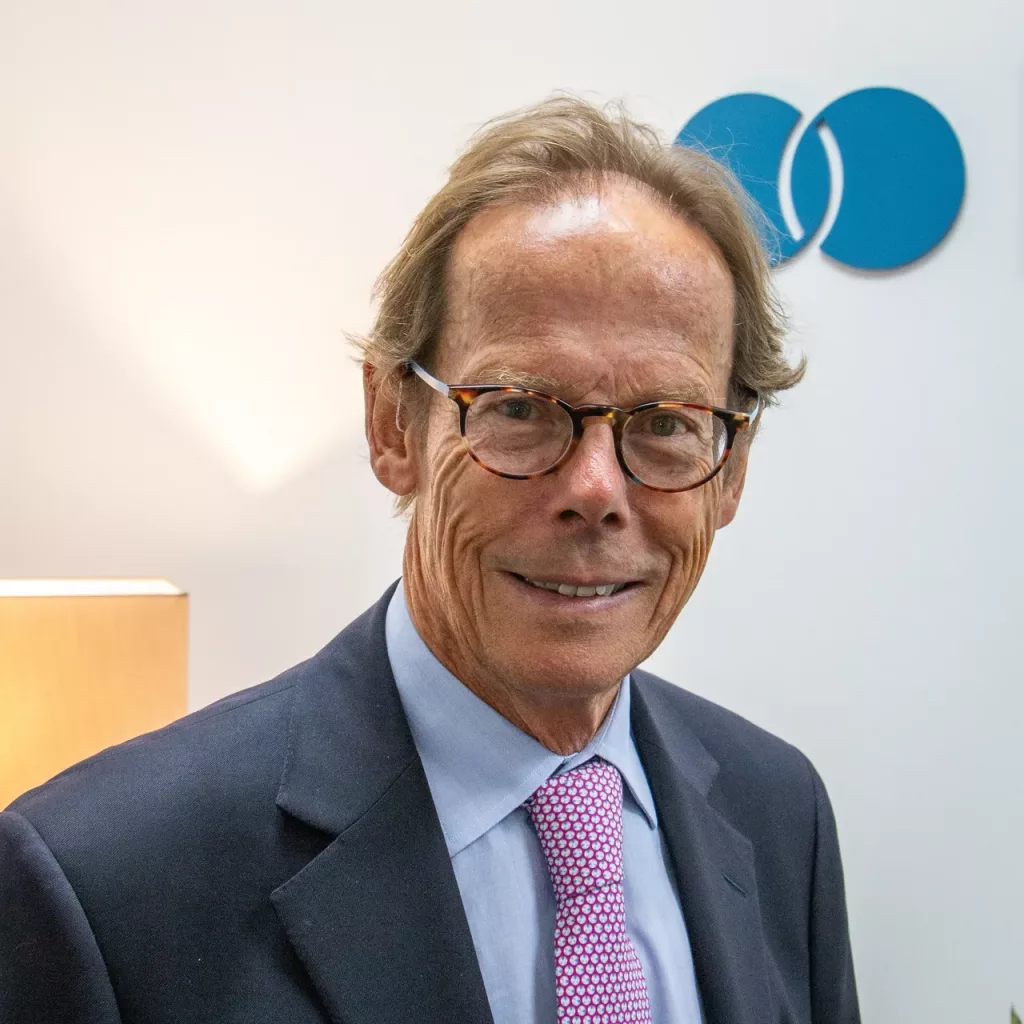28 June 2021|Latest Posts, Meet the Successful Founder

James founded Intralink in 1990 to help British firms do business in Japan. Having just celebrated its 30th anniversary, Intralink has since grown to a 90-employee business, helping companies across Europe and North American to expand in Japan, China, South Korea and Taiwan. James is now Chairman of Intralink and still as passionate about helping companies succeed overseas as the day he started the business. We were delighted to catch up with James as part of our Meet the Successful Founder Series and discover more about his entrepreneurship journey.
Can you tell us about your background and the company?
My early career included a couple of years as a management trainee with a builders’ merchants, then a period with a ‘stock jobber’ in the City. In 1969, I fled a gloomy UK economy and worked in Hong Kong and Japan before returning – with three kids – to Manchester to join a textile company. But garment manufacturing was going through massive change and it wasn’t long before I was made redundant.
As I was born in China and spent time working in Asia, Intralink was originally born out of a desire to capitalise on that experience.
Today, we have 90 employees and, through our business-getting offices in the UK, US, France, Poland and Israel, we’re helping western companies build their business through our Asia offices in mainland China, Taiwan, South Korea and Japan.
How did the idea come to you for the company?
Frustrated by the politics and bureaucracy of large corporations, I’d long dreamed of ‘going it alone’. But with kids, a mortgage and a decent salary, it was only when I was made redundant aged 42 that I knew it was time to turn the dream into a living.
The catalyst wasn’t a business plan, product or lightbulb moment. It was an impulsive, £1,000 bet – with a contact I met at a kids’ hockey match – that I could find 10 interesting new products in Japan which his company could distribute through high street pharmacies.
%20receiving%20Queen's%20Award.JPG/:/cr=t:0%25,l:0%25,w:100%25,h:100%25/rs=w:1280)
How did you achieve awareness?
In pre-digital days, and without any advertising money, it was partly about tapping family, friends and my personal network – but the real answer was ‘shoe leather’. I spent a lot of time cold calling and 35,000 miles a year visiting prospects.
It helped that I was appointed a pro-bono Japan advisor to the DTI. I offered to participate in any discussion or write any article about Japan. I also convinced a retired British Ambassador to Japan to join the business as a director, which gave us gravitas.
I discovered the value of staying in touch, even when a prospect said they weren’t interested. When I found a press article on Japan, I’d cut it out and send it to every relevant prospect.
Gaining awareness was agonisingly slow, but a good example of tenacity paying off was a prospect I’d followed for seven years finally signing on – and then proving extremely loyal.
Of course, the longer you survive, the more client endorsements you amass and awareness you build.
Nowadays, connections, word of mouth reputation and direct sales are still vital, but we have a much broader marketing programme to complement that.
How have you been able to gain funding and grow?
It seems extraordinary now, but I went into the Bank of Scotland in Manchester and asked for a £10k credit line without a business plan or any assets, and knowing my wife would refuse to remortgage the house – and they agreed.
Cost control was a big priority in the early days. I flew economy, stayed in the cheapest ‘capsule’ hotels, walked to meetings and missed lunch. I even kept an old bike hidden down a back alley in Tokyo to get around. In the months when the till was empty, I didn’t pay myself – which happened more often than I care to remember!
An important factor underpinning our ability to self-finance was getting paid on time. It became a Monday morning job that was almost as important and difficult as cold calling prospects. We’d invoice for settlement on the 20th, which allowed us to chase on the 21stand gave us a better chance of being included in that month’s payment run.
In 2011, we raised a £1 million unsecured loan as part-funding for a management buyout. And, to the chagrin of the bank, we repaid it in half the allocated time! This was the only time in 30 years we borrowed money.
What factors have underpinned your success?
In month four after setting up, through a combination of unlikely coincidences, a Japanese company signed up to a monthly retainer which went a long way to covering our costs. It was an amazing leap of faith on their part and got me off to a great start.
In our third year, we secured a client for whom we acted as an interim manager to transition their business from a local distributor to being owner-operated. This move away from pure consulting proved critical to our future. We began focussing on implementation and developed an easy-to-understand, scalable ‘wrapper’ which we called the ‘surrogate sales service’ – which remains a cornerstone of our business today.
A vital part of our growth has been a ‘cooperative’ approach to success. For years, whenever we had a result, the cash benefits would be shared with everyone in the business. We also introduced a generous share option scheme.
Another big factor has been referrals. From the outset, I under-promised and over-delivered and this paid us back by the bucket-load. Today, close to 60% of our clients are repeats and referrals.
Recently winning the Queen’s Award for Enterprise gave us great kudos – soon after boosted by the President’s Award on the other side of the Atlantic.
And we’ve managed to strike some amazing deals with Asian corporations on behalf of our clients. Interestingly, this includes the current pandemic period when we’ve managed to conclude more sales for our clients than ever – including a game-changing, £36 million deal for a UK energy tech firm.
What have the challenges been and how have you overcome them?
There were nights in the first five years when I woke in a cold sweat worrying about where the next piece of business would come from, whether a big debt would be paid or if I could pay the mortgage.
A big early client provided an income breakthrough but was almost our downfall as we over-extended, failed to keep the prospect hopper full and left our other clients unloved. Lesson learnt: never be too dependent on one client.
After the first few years, I knew we’d survive, but the business depended heavily on me, so the challenge was how to scale it. The key proved to be the ‘surrogate sales’ approach backed by a highly disciplined, transparent process.
In the early years, we had several ‘character-building’ challenges beyond our control including the bursting of Japan’s economic bubble, the 2002 SARS epidemic in China and, when we opened in the US in 2008, a global economy heading into meltdown. It also took us two attempts to set up in South Korea.
More recently, COVID-19 initially hit us hard as clients postponed plans for international expansion. But we re-engineered our services to adapt to the obstacles – especially the international travel ban. And our business rebounded astoundingly well in the second half of last year, finishing 31% up on the first.
Throughout all these challenges, we’ve pulled through and gone on to thrive because of a robust business model, a sharp focus on our core markets, a strong culture of perseverance and, above all else, a passionate, spirited team of employees.
What are your plans now/for the future?
We’re working hard to grow our sales teams across Europe, the US and Israel. We’re deepening our specialisation in our core sectors – including life sciences, digital and green transformation and automotive. And we’re seeing a growing business acting for East Asian corporations searching for partners from the European tech hubs.
Longer term, the opportunities are so great, managing our growth will be a critical factor in our continued success.
What would you share with others to encourage them to start their own entrepreneurship journey?
It doesn’t matter how brilliant your idea, plan or product; until someone buys what you’re selling, you don’t have a business.
Can you share your top tips for entrepreneurial success?
Listen and reflect, but then be brave and decisive.
Keep a sense of humour, have another passion and take your holidays.
Hire smart people with plenty of attitude.
Don’t be afraid to fail the first time around as it’s all part of the learning process.
Remember cash is critical, but customers and staff make a business.
Most importantly, never give up!
Who are the 5 people who inspire you the most and why?
I’m inspired by my children, who are making their way in a very different world to the one I faced … by the astonishing commitment of top athletes … by the ability of artists to speak through their craft … by Intralink’s CEO, Greg Sutch, who has worked with me selflessly and with infinite skill for 26 years and counting … and by my wife, who let me live the dream.
What are your favourite inspirational /motivational quotes?
The importance of the 4 Cs: Courage, Commitment, Common Sense and Consideration
‘A stain is worse than death’ is also a great motto, passed down from my father
What are your social handles and website links so our readers can connect with you?
You can find out more about Intralink at www.intralinkgroup.com.
And connect with me on LinkedIn at https://www.linkedin.com/in/james-lawson-966382a/
- lisafoundersitehttps://thesuccessfulfounder.com/author/lisafoundersite/
- lisafoundersitehttps://thesuccessfulfounder.com/author/lisafoundersite/
- lisafoundersitehttps://thesuccessfulfounder.com/author/lisafoundersite/
- lisafoundersitehttps://thesuccessfulfounder.com/author/lisafoundersite/





